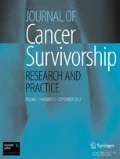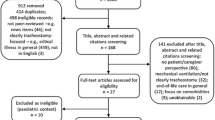Abstract
Purpose
Evidence suggests that quitting smoking improves symptoms as well as disease-related mortality for cancer patients. However, smoking cessation support is typically not well integrated into routine cancer care even in the case of lung cancer.. We explored surgical lung cancer patients’ views about smoking and about their preferences for support to help them to quit.
Methods
We conducted semi-structured, qualitative interviews with 22 surgical lung cancer patients with a smoking history, after treatment with surgery. Data were analysed using the framework approach.
Results
Although diagnosis promoted a successful quit attempt in some, others continued smoking or relapsed after a quit attempt. Most participants wished they were a non-smoker but, in conflict with this, also felt that smoking was enjoyable, helped with psychological coping or had some health benefits. Some also demonstrated a fatalist attitude towards the potential detrimental health effects. However, all participants felt that it was important for health professionals to address smoking and some wanted cessation support although it was often not provided. Participants wanted support to start as early as possible and to continue for the first weeks after discharge.
Conclusions
Surgical lung cancer patients often stop smoking during hospitalisation, and many want to remain quit but relapse shortly after discharge. Although it is often not provided, many patients want to be offered support to help them quit.
Implications for Cancer Survivors
Surveys suggest that clinicians believe that addressing smoking will be difficult and/or unwanted. However, these findings suggest that surgical lung cancer patients would tolerate, and most would prefer, integration of smoking cessation support into routine cancer care.
Similar content being viewed by others
References
Morabia A, Wynder EL. Cigarette smoking and lung cancer cell types. Cancer. 1991;68(9):2074–8.
Khunder SA. Effect of cigarette smoking on major histological types of lung cancer: a meta-analysis. Lung Cancer. 2001;31:139–48.
Parkin DM. Tobacco-attributable cancer burden in the UK in 2010. Br J Cancer. 2011;105:S6–S13.
Park ER, Japuntich SJ, Rigotti NA, et al. A snapshot of smokers after lung and colorectal cancer diagnosis. Cancer. 2012;118:3153–64.
Cooley ME, Sarna L, Kotlerman J, et al. Smoking cessation is challenging even for patients recovering from lung cancer surgery with curative intent. Lung Cancer. 2009;66:218–25.
Dresler CM, Bailey M, Roper CR, et al. Smoking cessation and lung cancer resection. CHEST J. 1996;110:1199–202.
Gritz ER. Smoking and smoking cessation in cancer patients. Br J Addict. 1991;86:549–54.
CRUK. Lung cancer survival rates http:www.cancerresearchuk.org/cancer-help/type/lung-cancer/treatment/statistics-and-outlook-for-lung-cancer [date of access 23/02/2015]
Garces YI, Yang P, Parkinson J, et al. The relationship between cigarette smoking and quality of life after lung cancer diagnosis. CHEST J. 2004;126:1733–41.
Daniel M, Keefe FJ, Lyna P, et al. Persistent smoking after a diagnosis of lung cancer is associated with higher reported pain levels. J Pain. 2009;10:323–8.
Moller AM, Villebro N, Pedersen T, et al. Effect of preoperative smoking intervention on postoperative complications; a randomised clinical trial. Lancet. 2002;359:114–7.
Erhunmwunsee L, Onaitis M. Smoking cessation and the success of lung cancer surgery. Curr Oncol Rep. 2009;11:269–74.
Parsons A, Daley A, Begh R, et al. Influence of smoking cessation after diagnosis of early stage lung cancer on prognosis: systematic review of observational studies with meta-analysis. BMJ. 2010;340:B5569.
Warren G, Marshall J, Cummings KM, et al. Practice patterns and perceptions of thoracic oncology providers on tobacco use and cessation in cancer patients. J Thorac Oncol. 2013;8:543–8.
Warren GW, Marshall JR, Cummings KM, et al. Addressing tobacco use in patients with cancer: a survey of American society of clinical oncology member. J Oncol Pract. 2013;9:258–62.
Dresler CM, Gritz ER. Smoking, smoking cessation and the oncologist. Lung Cancer. 2001;34:315–23.
Richie J, Lewis J. Qualitative research practice. 1st ed. Sage, 2007
Taylor T, Lager D, Bryant A et al. Smoking related behaviour and attitudes. Office for National Statistics 2008–2009, 2009 http://www.ons.gov.uk/ons/rel/lifestyles/smoking-related-behaviour-and-attitudes/index.html
Fidler JA, West R. Self-perceived smoking motives and their correlates in a general population sample. Nicotine Tob Res. 2009;11:1182–8.
LoConte NK, Else-Quest NM, Eickhoff J, Hyde J, Schiller JH. Assessment of guilt and shame in patients with non-small cell lung cancer compared with patients with breast and prostate cancer. Clin Lung Cancer. 2008;9(3):171–8.
Halding AG, Heggdal K, Wahl A. Experiences of self-blame and stigmatisation for self-inflication among individuals livings with COPD. Scand J Caring Sci. 2011;25:100–7.
Steinberg MB, Schmelzer AC, Lin PN, et al. Smoking as a chronic disease. Curr Cardiol Risk. 2010;4:413–20.
Wong J, Lam D, Abrishami A, et al. Short-term preoperative smoking cessation and postoperative complication: a systematic review and meta-analysis. Can J Anesth. 2012;59:268–79.
Mason DP, Subramanian S, Nowicki ER, et al. Impact of smoking cessation before resection of lung cancer: a society of thoracic surgeons general thoracic surgery database study. Ann Thorac Surg. 2009;88:362–71.
Rigotti N, Munafo MR, Stead LF. Interventions for smoking cessation in hospitalised patients. Cochrane Database Syst Rev. 2012;5, CD001837. doi:10.1002/14651858.CD001837.pub3.
Thomsen T, Tonnesen H, Moller AM. Effect of preoperative smoking cessation interventions on postoperative complications and smoking cessation. Br J Surg. 2009;96:451–61.
National Institute of Health and Clinical Excellence. Smoking cessation in secondary care: acute, maternity and mental health services. 2013;NICE guidelines [PH48]
Compliance with ethical standards
Prof. Aveyard reports grants from UK Centre for Tobacco Control Studies (UKCRC) and grants from NIHR School for Primary Care Research, during the conduct of the study; and personal fees from Pfizer and personal fees from McNeil, outside the submitted work. Amanda Farley reports grants from UK Centre for Tobacco Control Studies (UKCRC) and grants from NIHR School for Primary Care Research, during the conduct of the study. Babu Naidu reports grants from NIHR School for Primary Care Research, during the conduct of the study. Amy Kerr and George Dowswell report no support from any organisation for the submitted work, no financial relationships with any organisations that might have an interest in the submitted work in the previous 3 years and no other relationships or activities that could appear to have influenced the submitted work. All procedures performed in studies involving human participants were in accordance with the ethical standards of the institutional and/or national research committee and with the 1964 Helsinki Declaration and its later amendments or comparable ethical standards. We were granted ethical approval by the Birmingham, East, North and Solihull Research Ethics Committee (REC ref no: 09/H1206/4). Informed consent was obtained from all individual participants included in the study.
Funding
The study was funded by the National Institute for Health Research (NIHR) School for Primary Care Research (SPCR). AF and PA were also part funded by The UK Centre for Tobacco and Alcohol Studies, a UKCRC Public Health Research: Centre of Excellence. Funding from British Heart Foundation, Cancer Research UK, Economic and Social Research Council, Medical Research Council and the Department of Health, under the auspices of the UK Clinical Research Collaboration, is gratefully acknowledged. The views expressed are those of the author(s) and not necessarily those of the NHS, the NIHR or the Department of Health.
Conflict of interest
Prof. Aveyard reports grants from UK Centre for Tobacco and Alcohol Studies (UKCRC) (Grant number: MRC MR/k/023195/1) and the NIHR School for Primary Care Research (grant number: 2.69) and one day consultancy for Pfizer on smoking cessation in 2012 which led to a payment to him and the University of Oxford; Amanda Farley and Babu Naidu report a grant from NIHR School for Primary Care Research (grant number: 2.69); Amy Kerr and George Dowswell declare that they have no conflicts of interest.
Author information
Authors and Affiliations
Corresponding author
Rights and permissions
About this article
Cite this article
Farley, A., Aveyard, P., Kerr, A. et al. Surgical lung cancer patients’ views about smoking and support to quit after diagnosis: a qualitative study. J Cancer Surviv 10, 312–319 (2016). https://doi.org/10.1007/s11764-015-0477-4
Received:
Accepted:
Published:
Issue Date:
DOI: https://doi.org/10.1007/s11764-015-0477-4




